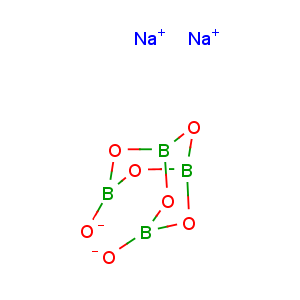Title: Sodium Borate
CAS Registry Number: 1330-43-4
CAS Name: Boron sodium oxide (B4Na2O7)
Synonyms: anhydrous borax; borax glass; fused borax; sodium biborate; sodium pyroborate; sodium tetraborate
Molecular Formula: B4Na2O7
Molecular Weight: 201.22
Percent Composition: B 21.49%, Na 22.85%, O 55.66%
Line Formula: Na2B4O7
Literature References: Toxicity: H. F. Smyth
et al., Am. Ind. Hyg. Assoc. J. 30, 470 (1969). Review of toxicology and human exposure:
Toxicological Profile for Boron (PB93-110674, 1992) 110 pp.
Properties: Powder or glass-like plates becoming opaque on exposure to air. Slowly sol in water.
Derivative Type: Decahydrate
CAS Registry Number: 1303-96-4
Synonyms: Borax
Trademarks: Jaikin (Basotherm)
Properties: Hard odorless crystals, granules or cryst powder; efflorescent in dry air, the crystal often being coated with white powder. d 1.73. Melts when rapidly heated at 75°; at 100° loses 5H2O; at 150° loses 9H2O; becomes anhydr at 320°. One gram dissolves in 16 ml water, 0.6 ml boiling water, about 1 ml glycerol. Insol in alcohol. The aq soln is alkaline to litmus and phenolphthalein. pH about 9.5. Borax dissolves many metallic oxides when fused with them. LD50 orally in rats: 5.66 g/kg (Smyth).
Density: d 1.73
Toxicity data: LD50 orally in rats: 5.66 g/kg (Smyth)
CAUTION: Potential symptoms of overexposure are irritation of eyes, skin, upper respiratory system; dermatitis; epistaxis; cough, dyspnea.
See NIOSH Pocket Guide to Chemical Hazards (DHHS/NIOSH 97-140, 1997) p 30.
Use: Soldering metals; manuf glazes and enamels; tanning; in cleaning compds; artificially aging wood; as preservative, either alone or with other antiseptics against wood fungus; fireproofing fabrics and wood; curing and preserving skins; in cockroach control. Pharmaceutic aid (alkalizer).
Therap-Cat-Vet: Has been used as antiseptic, detergent, astringent for mucous membranes.

